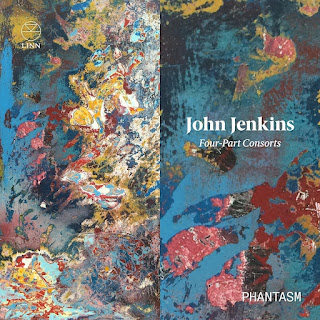John Jenkins Four-Part Consorts; Phantasm; LINN
Reviewed by Robert Hugill on 22 February 2022 Star rating: (★★★★)
Phantasm brings to a close its project to record all of John Jenkins' consorts with a finely imaginative and engaging disc of the intricate four-part consorts
The composer John Jenkins was long-active and prolific, he is recorded in 1634 as one of the musicians performed the masque The Triumph of Peace at the court of King Charles I, he went on to successfully weather the Civil War by sheltering in the country with a number of Royalist patrons, and ended his life with a court position after the Restoration. He wrote extensive amounts music for viols and was a noted virtuoso on the lyra viol. The viol consort Phantasm has been exploring Jenkins music for viols and having recorded his five-part and six-part consorts, Phantasm has now recorded John Jenkins' Four-part consorts on LINN records. For the disc Phantasm (Laurence Dreyfus, Jonathan Manson, Emilia Benjamin, Markku Luolajan-Mikkola) are joined by Daniel Hyde (organ).
There are 19 works on the disc, 17 Fantasies, and two Pavans, music that was largely composed in the 1620s. This is highly civilised music and complex. Jenkins does not have the quirky imagination of his friend and colleague William Lawes, and instead is interested in the busy interplay of four parts. But that is not to say that the music is conventional. You don't go away humming the tunes, instead this is intricate and often lively polyphonic writing. This is intricate music, for four equal parts, the four players equally taxed and all needing to be part of a whole. The writing of one part only making complete sense when mixed in with the others. Within this, Jenkins does unexpected things, he allows the very intricacy to carry him away.
It is intriguing to wonder who this music was written for and by whom it was performed. We have reports from the period of the way that music crossed class-boundaries in ways that rarely happened. To perform these consorts you need four players of equal talent and experience, no passengers, the music does not work otherwise. Which means that as Laurence Dreyfus describes in his admirable booklet article, "a consort might include a mix of professionals, amateur gentlemen, tradesmen, even servants. In domestic settings, educated ‘ladies’ also participated in viol consorts, contributing to a social mélange distinctive for its time." In a way this harks back to an earlier period, when the nobility might employ servants specifically for their musical abilities.
This music could often be performed with a sort of chamber organ continuo, the shadowing of the organ allowing for improved musical cohesion and on this disc Daniel Hyde plays on 11 of the tracks. Lawes would write consorts with an independent keyboard part, but here the organ Jenkins' organ part is simply a short score, duplicating some of the viol lines. The reason for Hyde's absence from some tracks was as a compromise, so that for some pieces the viols sounded alone. We can enjoy the distinctive tang of the four viols together, but having an organ hovering in the background brings a sort of magical glow to this music.
Whilst Jenkins is not exactly absent from the catalogue, this is not exactly common music and it is good to have them in the catalogue, a reminder of the sheer riches of the viol repertoire. The ensemble has already released recordings of Jenkins' five-part and six-part consorts, so it is good to have this final set. But it has been quite a wait, the recording was made ten years ago.
The performances here are mellow in tone, rhythmically alert and constantly engaging. The players create a real sense of four equal parts and clearly enjoy both the challenges and the intricacies of Jenkins' writing.
John Jenkins (1592-1678) - Four-Part Consorts
Phantasm (Laurence Dreyfus, treble viol & director, Jonathan Manson, tenor viol, Emilia Benjamin, tenor viol, Markku Luolajan-Mikkola, bass viol)
Daniel Hyde (organ)
Recorded at St Martin's Church, East Woodhay, Newbury, UK, 30 September - 2 October 2012.
LINN CKD677 1CD [76.15]
Available from Amazon.
Never miss out on future posts by following us
The blog is free, but I'd be delighted if you were to show your appreciation by buying me a coffee.
Elsewhere on this blog
- Early Moderns: the (very) first Viennese School from American Baroque ensemble Quicksilver - record review
- Most pieces use the dichotomy between tonality and atonality: I chat to composer Eleanor Alberga about writing music - interview
- Certainly not traditional, but true to the work's spirit and dramaturgy: Edward Dick's production of Bizet's Carmen returns to Opera North with Chrystal E Williams back in the title role - opera review
- Mendelssohn and Schumann from Antonello Manacorda and the Orchestra of the Age of Enlightenment - concert review
- Snapshots of a Romance: Elizabeth Llewellyn and Simon Lepper at Classical Vauxhall - concert review
- Vividly theatrical: Irish National Opera's production of Vivaldi's Bajazet at Covent Garden - opera review
- Devastates & dazzles: Jakub Józef Orlinski, Il Pomo d'Oro & Francesco Corti in rare 18th century arias at Wigmore Hall - concert review
- György Cziffra: Pianist János Balázs on celebrating the great Hungarian's centenary & continuing his artistic legacy - interview
- Mélodies: French song and Czech rarities from two young Czech singers - record review
- Orchestra of the Swan celebrates the centenary of Walton's Façade on SOMM - record review
- In the midst of things: chamber music by Karl Fiorini - record review
- Love Island? Tim Albery at Opera North takes an intense, modern look at Handel's Alcina - opera review
- Home












No comments:
Post a Comment